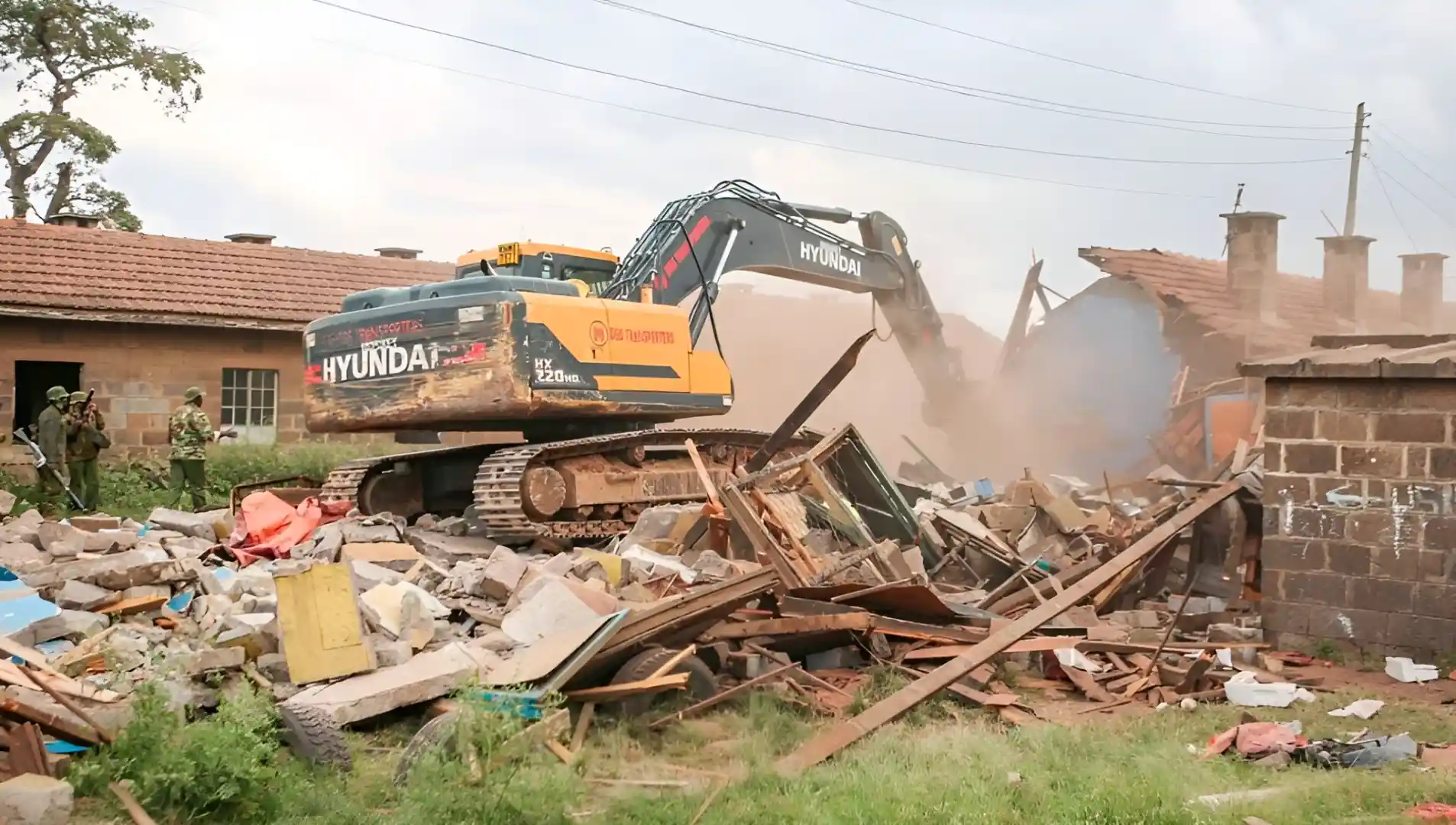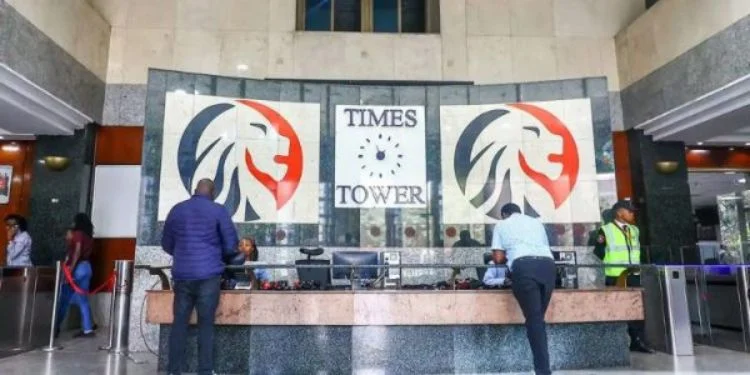The Law Society of Kenya (LSK) has issued an urgent demand for the immediate suspension of demolition activities at Makongeni Estate in Nairobi, citing the government’s failure to compensate residents before eviction as a fundamental violation of their constitutional rights. The call comes as hundreds of families found themselves displaced over the weekend, with many yet to receive the relocation facilitation funds they were promised before being forced to vacate their homes.
The demolitions, which commenced on Sunday, November 23, 2025, caught hundreds of residents off guard as excavators, accompanied by heavily-armed anti-riot police officers, moved into the sprawling estate to begin clearing structures. The operation has affected an estate that serves as home to at least 40,000 Kenyans, many of whom are low-income families who have lived in Makongeni for decades.
Build the future you deserve. Get started with our top-tier Online courses: ACCA, HESI A2, ATI TEAS 7, HESI EXIT, NCLEX-RN, NCLEX-PN, and Financial Literacy. Let Serrari Ed guide your path to success. Enroll today.
Constitutional Rights Violated, Says Law Society
LSK President Faith Odhiambo has taken a firm stance against the manner in which the demolitions are being conducted, warning that the ongoing evictions violate established Supreme Court standards that require proper notice, respect for human dignity, and special protection for vulnerable groups within affected communities.
“We are aware that residents had been issued with notices to vacate, subject to payment of Relocation Facilitation Funds. However, the majority are yet to receive their compensation, making the notices ostensibly ineffective,” Odhiambo stated in her official response to the demolitions. Her remarks highlight a critical disconnect between the legal requirements for evictions and the reality on the ground, where residents are being displaced before receiving the financial assistance promised to facilitate their relocation.
The LSK President referenced the landmark Supreme Court ruling in Musembi v MEC (2021), which established minimum standards that must be observed during evictions in Kenya. This precedent-setting case outlined comprehensive protections for citizens facing displacement, creating a legal framework designed to prevent exactly the kind of situation now unfolding at Makongeni Estate.
According to the Musembi ruling, evictions must meet several mandatory requirements including providing written notice to affected persons well in advance of any demolition activity, conducting evictions in a manner that respects the dignity, right to life, and security of all affected persons, implementing special protections for the rights of women, the elderly, children, and persons with disabilities, and allowing affected persons the first opportunity to demolish their own structures and salvage their property before any government-led demolition begins.
“These ongoing demolitions offend these fundamental principles and should therefore be suspended to protect residents’ rights. We intend to take the necessary legal interventions to uphold the rule of law,” Odhiambo added, signaling that the Law Society is prepared to pursue court action to halt the demolitions if the government does not voluntarily comply with constitutional requirements.
Arrests of Residents Association Officials Spark Further Controversy
Adding another layer of controversy to the already contentious situation, the LSK has expressed grave concern over the arrest of officials from the Makongeni Estate Residents Association, including Chairman Samuel Ngugi. The legal body has called for the immediate release of the arrested officials, describing their detention as an attempt to silence legitimate community representation during a critical moment for residents.
“Attempts to secure their release on police bail have been denied. We urge the police to present them to court first thing tomorrow morning,” Odhiambo wrote on the social media platform X on Sunday evening, drawing attention to what the Law Society views as an improper denial of bail for individuals who have not been charged with violent crimes.
The arrest of community leaders during demolitions has become a recurring pattern in Kenya’s urban redevelopment projects, raising questions about whether such actions are intended to prevent organized resistance to government initiatives. Civil society organizations have repeatedly criticized this approach, arguing that it undermines democratic principles and denies communities the right to advocate for their interests through chosen representatives.
Chaotic Scenes as Demolition Crews Move In
Eyewitness accounts from Sunday describe chaotic scenes as excavators, flanked by lines of anti-riot police officers in full gear, began tearing down the estate’s aging structures. Residents who had not yet completed the five-day notice period found themselves racing against time to salvage their belongings as their homes were demolished around them.
Many families were seen carrying furniture, household items, and personal possessions into the streets, with nowhere to immediately relocate. Some residents reported that they had received their eviction notices only days earlier, leaving them insufficient time to arrange alternative accommodation, particularly given that they had not yet received the promised relocation funds that were supposed to facilitate their transition to new housing.
The presence of anti-riot police has raised concerns about the potential for violence and has created an atmosphere of fear and intimidation among residents. While authorities justify the police presence as necessary to maintain order during the demolition process, community members and human rights advocates argue that such heavy security measures are disproportionate and create unnecessary tension in what is already a traumatic situation for affected families.
The Compensation Controversy: Promises vs. Reality
At the heart of the current crisis lies a fundamental disagreement over whether residents have been adequately compensated before being evicted. While some residents confirm receiving payments, many others insist they have been left empty-handed despite the government’s commitment to provide relocation facilitation funds.
Makadara Member of Parliament George Aladwa has defended the government’s process, asserting that residents have been properly compensated to facilitate their eviction from the estate. According to the MP, an agreement was reached whereby homeowners would receive Sh150,000 in cash along with allocation cards entitling them to own bedsitter apartments in the new affordable housing project that will be constructed on the site.
“We agreed that owners would be given Sh150,000 and cards enabling them to own bedsitters in the project. The Housing Board has been sending the money and issuing cards to the 4,500 registered people,” Aladwa stated, providing specific figures for the compensation arrangement and the number of residents who have been registered for the redevelopment project.
However, the MP’s assertions stand in stark contrast to reports from numerous residents who claim they have neither received the promised cash payments nor been issued allocation cards for units in the new development. This discrepancy suggests either significant administrative delays in disbursing compensation or incomplete record-keeping regarding which residents have actually received their payments.
The Sh150,000 compensation amount itself has also generated debate, with housing experts and residents questioning whether this sum is sufficient to secure alternative accommodation in Nairobi’s expensive rental market, even temporarily, while the redevelopment project is completed. For many low-income families, finding affordable housing in Nairobi has become increasingly difficult as the city experiences rapid gentrification and rising property costs.
One decision can change your entire career. Take that step with our Online courses in ACCA, HESI A2, ATI TEAS 7, HESI EXIT, NCLEX-RN, NCLEX-PN, and Financial Literacy. Join Serrari Ed and start building your brighter future today.
The Vision for Makongeni’s Transformation
Despite the controversy surrounding the demolition process, government officials and project proponents maintain that the redevelopment of Makongeni Estate represents a necessary and ultimately beneficial transformation that will significantly improve living conditions for residents.
MP Aladwa outlined an ambitious vision for the redeveloped estate, which he says is scheduled for completion within two years. According to the project plans, the new Makongeni will feature modern residential blocks offering improved housing units, commercial spaces that will create business opportunities for residents and generate economic activity, educational facilities including schools to serve the community’s children, healthcare facilities including hospitals and clinics providing accessible medical services, green parks and recreational spaces promoting environmental sustainability and quality of life, and other modern infrastructure including improved roads, water systems, and sanitation facilities.
This comprehensive development approach aligns with the Ruto administration’s affordable housing initiative, which aims to construct 200,000 housing units annually as part of the government’s broader economic transformation agenda. The Makongeni redevelopment is positioned as a flagship project demonstrating how older estates can be transformed into modern, mixed-use communities that provide not just housing but also amenities and economic opportunities.
Aladwa has also accused some opponents of the project of inciting youth to disrupt the demolition process, suggesting that resistance to the redevelopment is being orchestrated by individuals with ulterior motives rather than representing genuine community concerns.
“They are paying young people to block roads and cause disruptions. As the area MP, I would not have allowed the demolition if the process was not certified. I know I may lose some votes, but I am doing this for the people I represent. They will benefit once this project is complete,” the MP stated, striking a defiant tone while commending residents who voluntarily vacated their homes in compliance with the eviction notices.
Historical Context and the Kenya Railways Connection
Makongeni Estate occupies a significant place in Nairobi’s urban history. The 139-hectare site was originally acquired under the Kenya Railways Staff Retirement Benefits Scheme, making it one of the city’s older planned settlements designed to provide housing for railway workers and their families during the colonial and early independence periods.
Over the decades, Makongeni evolved from a railway workers’ estate into a diverse community housing Kenyans from various backgrounds and economic circumstances. However, many of the original structures have deteriorated significantly, with hundreds of buildings now classified as dilapidated and in urgent need of replacement or renovation.
The estate’s connection to Kenya Railways has complicated the redevelopment process, as questions have arisen regarding land ownership, the rights of original beneficiaries under the railway retirement scheme, and whether the current redevelopment properly accounts for the historical agreements under which the land was allocated. Some residents trace their occupancy rights back to these original railway allocations, creating complex legal questions about whether the government can simply demolish and redevelop without fully honoring these historical entitlements.
Broader Context: Kenya’s Affordable Housing Challenges
The Makongeni demolitions must be understood within the broader context of Kenya’s massive housing deficit and the government’s ambitious response through its affordable housing program. Various estimates place Kenya’s housing shortage at between 2 million and 3 million units, with the deficit growing annually as urbanization accelerates and the population increases.
President William Ruto has made affordable housing one of the cornerstone initiatives of his administration, arguing that providing decent shelter for all Kenyans is both a constitutional obligation and an economic imperative. The government contends that the housing program will not only address the accommodation crisis but also create hundreds of thousands of jobs in construction and related industries, stimulate demand for building materials and boost manufacturing, develop technical skills among Kenyan workers, and generate economic activity that will contribute to overall GDP growth.
However, the implementation of the affordable housing program has faced numerous challenges and controversies. The introduction of a housing levy deducted from workers’ salaries has proven unpopular, with legal challenges questioning its constitutionality and workers complaining about reduced take-home pay. Land acquisition for housing projects has been complicated by ownership disputes, environmental concerns, and resistance from communities facing displacement.
Recent reports have raised concerns about the readiness of the program, with county governors warning that only 54 of 540 acres earmarked for affordable housing have been properly titled, suggesting significant gaps in the preparatory work necessary for large-scale housing construction. These revelations have fueled skepticism about whether the government can actually deliver on its promise to construct 200,000 housing units annually.
Similar Controversies Across Nairobi
The Makongeni situation is not an isolated incident but rather part of a pattern of controversial demolitions and redevelopment projects across Nairobi and other Kenyan cities. Several other communities have experienced similar conflicts as the government pursues its urban renewal and affordable housing objectives.
Earlier this year, residents of Makongeni protested planned demolitions, expressing concerns about inadequate compensation and lack of clarity about their housing allocations in the new development. These earlier protests highlighted community fears that have now been validated by the current demolition process.
Additionally, there have been controversies involving religious institutions, with the Supreme Council of Kenya Muslims (SUPKEM) refuting claims linking the Huruma mosque to the affordable housing project, demonstrating how redevelopment initiatives can become entangled with sensitive community and religious issues.
Professional bodies have also raised concerns, with the Institution of Surveyors of Kenya protesting their exclusion from major government projects, arguing that proper surveying and land assessment are essential for legitimate redevelopment initiatives.
Legal Precedents and International Standards
Kenya’s legal framework for evictions and forced displacement has evolved significantly in recent years, largely through progressive court rulings that have established protections for affected communities. Beyond the Musembi case cited by the LSK, Kenyan courts have issued several other rulings emphasizing that evictions must be conducted as a last resort and only after all alternative solutions have been exhausted.
International human rights standards also provide relevant guidance. The United Nations Basic Principles and Guidelines on Development-Based Evictions and Displacement emphasize that evictions should only occur in exceptional circumstances, after exploring all feasible alternatives, and that affected persons must receive fair compensation and alternative accommodation before being displaced.
Kenya is also a signatory to various international human rights instruments that protect the right to adequate housing, including the International Covenant on Economic, Social and Cultural Rights. These obligations require the government to ensure that any evictions are carried out in accordance with international law and with full respect for human rights.
The Path Forward: Balancing Development and Rights
As legal interventions loom and tensions remain high at Makongeni Estate, the situation presents a critical test for Kenya’s commitment to balancing development objectives with respect for constitutional rights and the rule of law.
For the demolitions to proceed legitimately, several steps appear necessary. The government must immediately disburse all outstanding relocation facilitation funds to residents who have not yet received them, ensuring that compensation is provided before further demolitions occur. Authorities should provide adequate time for residents to secure alternative accommodation and relocate with dignity, rather than conducting rushed demolitions that leave families homeless.
The arrested residents association officials should be released or charged and presented in court in accordance with due process, and community representatives should be engaged in meaningful consultation about the redevelopment process rather than being silenced through arrest and intimidation. Clear, transparent records should be maintained showing which residents have been compensated and which have received allocation cards for the new development, addressing the current confusion and conflicting claims.
Additionally, the government should consider appointing an independent oversight mechanism to monitor the demolition and redevelopment process, ensuring compliance with constitutional requirements and addressing grievances from affected residents.
The Makongeni case will likely have implications far beyond this single estate, potentially setting precedents that will affect how future urban redevelopment projects are conducted across Kenya. As the country seeks to modernize its cities and address the housing deficit, finding ways to pursue these legitimate development goals while fully respecting the rights and dignity of affected communities will be essential.
For now, the immediate priority must be ensuring that no further demolitions proceed until all residents have received their promised compensation and have had adequate time to relocate. Only then can the transformation of Makongeni Estate proceed on a foundation of legality, fairness, and respect for the constitutional rights of all Kenyans.
Ready to take your career to the next level? Join our Online courses: ACCA, HESI A2, ATI TEAS 7 , HESI EXIT , NCLEX – RN and NCLEX – PN, Financial Literacy!🌟 Dive into a world of opportunities and empower yourself for success. Explore more at Serrari Ed and start your exciting journey today! ✨
Track GDP, Inflation and Central Bank rates for top African markets with Serrari’s comparator tool.
See today’s Treasury bonds and Money market funds movement across financial service providers in Kenya, using Serrari’s comparator tools.
Photo source: Google
By: Montel Kamau
Serrari Financial Analyst
25th November, 2025
Article, Financial and News Disclaimer
The Value of a Financial Advisor
While this article offers valuable insights, it is essential to recognize that personal finance can be highly complex and unique to each individual. A financial advisor provides professional expertise and personalized guidance to help you make well-informed decisions tailored to your specific circumstances and goals.
Beyond offering knowledge, a financial advisor serves as a trusted partner to help you stay disciplined, avoid common pitfalls, and remain focused on your long-term objectives. Their perspective and experience can complement your own efforts, enhancing your financial well-being and ensuring a more confident approach to managing your finances.
Disclaimer: This article is for informational purposes only and does not constitute financial advice. Readers are encouraged to consult a licensed financial advisor to obtain guidance specific to their financial situation.
Article and News Disclaimer
The information provided on www.serrarigroup.com is for general informational purposes only. While we strive to keep the information up to date and accurate, we make no representations or warranties of any kind, express or implied, about the completeness, accuracy, reliability, suitability, or availability with respect to the website or the information, products, services, or related graphics contained on the website for any purpose. Any reliance you place on such information is therefore strictly at your own risk.
www.serrarigroup.com is not responsible for any errors or omissions, or for the results obtained from the use of this information. All information on the website is provided on an as-is basis, with no guarantee of completeness, accuracy, timeliness, or of the results obtained from the use of this information, and without warranty of any kind, express or implied, including but not limited to warranties of performance, merchantability, and fitness for a particular purpose.
In no event will www.serrarigroup.com be liable to you or anyone else for any decision made or action taken in reliance on the information provided on the website or for any consequential, special, or similar damages, even if advised of the possibility of such damages.
The articles, news, and information presented on www.serrarigroup.com reflect the opinions of the respective authors and contributors and do not necessarily represent the views of the website or its management. Any views or opinions expressed are solely those of the individual authors and do not represent the website's views or opinions as a whole.
The content on www.serrarigroup.com may include links to external websites, which are provided for convenience and informational purposes only. We have no control over the nature, content, and availability of those sites. The inclusion of any links does not necessarily imply a recommendation or endorsement of the views expressed within them.
Every effort is made to keep the website up and running smoothly. However, www.serrarigroup.com takes no responsibility for, and will not be liable for, the website being temporarily unavailable due to technical issues beyond our control.
Please note that laws, regulations, and information can change rapidly, and we advise you to conduct further research and seek professional advice when necessary.
By using www.serrarigroup.com, you agree to this disclaimer and its terms. If you do not agree with this disclaimer, please do not use the website.
www.serrarigroup.com, reserves the right to update, modify, or remove any part of this disclaimer without prior notice. It is your responsibility to review this disclaimer periodically for changes.
Serrari Group 2025
















